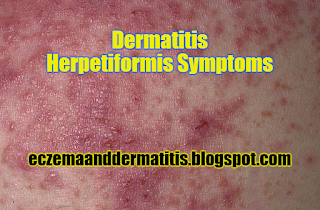Determining dermatitis herpetiformis symptoms, and distinguishing them from those of other, similar skin diseases, is a job for a fully qualified professional medical practitioner. This job cannot and should not be assigned to any of the quacks on the internet who masquerade as experts, peddling lame-brain remedies to unsuspecting buyers on their misleading websites.
In this day and age, skin diseases are legion. There are many different kinds of dermatitis as well as other skin diseases with different names. In some cases, the visible signs and symptoms of different skin complaints can be a little hard to distinguish for those who have no medical expertise. This is why dermatitis herpetiformis symptoms should only be diagnosed by a professional, fully accredited physician. A quick consultation with such a qualified clinician will result in an accurate diagnosis, followed by the appropriate course of treatment aimed at a successful outcome in all cases.
Dermatitis herpetiformis is a skin disease that typically hits people in their twenties. It affects males and females equally. The symptoms of the complaint vary a little but normally there is severe itching experienced by patients. This is followed by bumps and reddened blisters that mostly appear on the scalp, knees, wrists, elbows, and also on patients’ buttocks. That is the long and the short of it so far as dermatitis herpetiformis symptoms are concerned. But what are sufferers to make of all this?
People who find themselves in the unenviable position of having their lives blighted by the visible signs and terrible symptoms of dermatitis herpetiformis would naturally like to know what is causing their condition. Unfortunately the medical world has yet to come up with a definitive answer on that one. However, it is believed that consumption of gluten in your day to day diet could be a contributing factor. The jury is out on that particular theory, because large numbers of people eat a mountain of gluten yet suffer no ill effects from doing so.
However, the fact remains that some people who previously consumed gluten on a day to day basis have reported that when they cut out this substance from their daily intake of foodstuffs their dermatitis herpetiformis symptoms were noticeably diminished or even vanished completely in some cases. We should be very wary of jumping to conclusions and assuming that removing gluten from day to day diets represents a magical cure-all that can solve the problem of dermatitis herpetiformis, but it is probably worthy of further investigation.
Victims of dermatitis herpetiformis may be tempted to self-medicate after reading message boards and quack medicine websites. However, this would be an unwise move. In all fairness, treating dermatitis herpetiformis symptoms is best approached by booking in for a consultation with a professional medical practitioner as a matter of urgency. Only medics with the full training are knowledgeable and expert enough to give a proper diagnosis of your symptoms. Such practitioners can take a long hard look at your symptoms and then prescribe you the very best form of treatment, which is likely to be a combination of steroid-packed topical creams and a shift to a gluten-free diet.
In this day and age, skin diseases are legion. There are many different kinds of dermatitis as well as other skin diseases with different names. In some cases, the visible signs and symptoms of different skin complaints can be a little hard to distinguish for those who have no medical expertise. This is why dermatitis herpetiformis symptoms should only be diagnosed by a professional, fully accredited physician. A quick consultation with such a qualified clinician will result in an accurate diagnosis, followed by the appropriate course of treatment aimed at a successful outcome in all cases.
Dermatitis herpetiformis is a skin disease that typically hits people in their twenties. It affects males and females equally. The symptoms of the complaint vary a little but normally there is severe itching experienced by patients. This is followed by bumps and reddened blisters that mostly appear on the scalp, knees, wrists, elbows, and also on patients’ buttocks. That is the long and the short of it so far as dermatitis herpetiformis symptoms are concerned. But what are sufferers to make of all this?
People who find themselves in the unenviable position of having their lives blighted by the visible signs and terrible symptoms of dermatitis herpetiformis would naturally like to know what is causing their condition. Unfortunately the medical world has yet to come up with a definitive answer on that one. However, it is believed that consumption of gluten in your day to day diet could be a contributing factor. The jury is out on that particular theory, because large numbers of people eat a mountain of gluten yet suffer no ill effects from doing so.
However, the fact remains that some people who previously consumed gluten on a day to day basis have reported that when they cut out this substance from their daily intake of foodstuffs their dermatitis herpetiformis symptoms were noticeably diminished or even vanished completely in some cases. We should be very wary of jumping to conclusions and assuming that removing gluten from day to day diets represents a magical cure-all that can solve the problem of dermatitis herpetiformis, but it is probably worthy of further investigation.
Victims of dermatitis herpetiformis may be tempted to self-medicate after reading message boards and quack medicine websites. However, this would be an unwise move. In all fairness, treating dermatitis herpetiformis symptoms is best approached by booking in for a consultation with a professional medical practitioner as a matter of urgency. Only medics with the full training are knowledgeable and expert enough to give a proper diagnosis of your symptoms. Such practitioners can take a long hard look at your symptoms and then prescribe you the very best form of treatment, which is likely to be a combination of steroid-packed topical creams and a shift to a gluten-free diet.
Source: stasisdermatitis.net/dermatitis-herpetiformis-symptoms/







0 Comments:
Post a Comment